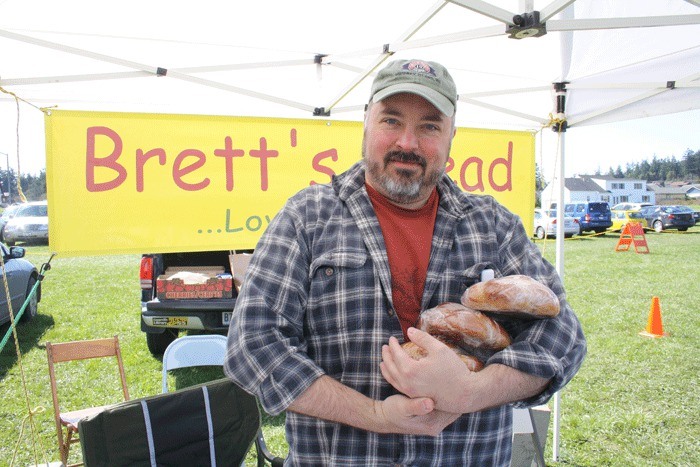The days of Fido begging for a tasty snippet of bread are ending as small-scale commercial bakers producing out of their homes will have to develop a plan to limit kitchen access of pets as well as young children.
An access plan is just one part of the 2013 state requirements that have at least one small business owner in Coupeville concerned whether he will be able to keep selling the bread he bakes.
Brett Rebischke-Smith, owner of Brett’s Bread, a fixture at the Coupeville Farmers Market on Saturdays, is concerned new cottage industry regulations will add more requirements and expenses, leaving him unable to remain in business.
“It’s really sort of up in the air right now,” Rebischke-Smith said, expressing frustration about the lack of information available from the Washington State Department of Agriculture about the new regulations.
Rebischke-Smith, who is also a stay-at-home dad, has been selling his sweet egg bread at the Coupeville Farmers Market since 2008.
The new rules, which were approved by the 2011 Legislature, outline the licensing requirements cottage business owners must meet in order to produce food from their home kitchen. Those regulations go into effect in 2013.
Typically, food that is sold to the public has to be produced in a commercial kitchen. On Whidbey Island, however, people selling bread, cookies, cakes and other low-hazard baked goods have been receiving an exemption to operate. They merely needed a food handler’s permit to sell.
“We’ve been anticipating this for the last two to three years,” said Shirlee Read, owner of The Kitchen Door on South Whidbey. She has been selling pies at the Bayview Farmers Market for the past 12 years.
Island County was one of the few counties in the state to provide such an exemption.
With the new rules, bakers will have to either apply for a license through the state Department of Agriculture, install a commercial kitchen at their home or find a commercial kitchen from which to prepare food.
The Agriculture Department is currently drafting rules to implement the law and cottage business owners have until 2013 to comply. The rules are aimed at food producers that have gross sales less than $15,000 per year.
Sally Waters, food program manager for the Island County Health Department, said she is communicating with farmers market vendors about the change of the law and the deadline they have to meet it. She hopes informing folks at the beginning of the 2012 market season will give people time to prepare for the changes.
“What we’re hoping is that people will go through the WSDA food safety program,” Waters said.
The draft of Cottage Food Operations, available on the Washington State Department of Agriculture website, outlines the requirements folks need to meet if they use their home kitchen. Staff from the department of agriculture will have to inspect the home kitchens.
In addition to documenting the equipment in the home kitchen, people would have to provide, among other things, plans preventing children and pets from entering the kitchen during food production times.
“What we’re looking for here is cleanliness,” said Kirk Robinson, assistant director for the Washington State Department of Agriculture. He oversees the food safety and consumer services program. He added that inspectors will also look at plans that bar access of young children and pets during food production times and the labels that have to be placed on products.
“It’s going to create a bureaucratic nightmare for them,” Read said of the inspection process instituted by the Department of Agriculture.
The application and inspection process would be $75 for the public health review, $125 for the inspection, and $30 for application processing and a one-year permit, according to the Department of Agriculture website.
Read said the license costs will be a financial blow to many food producers who sell at farmers markets to make a little extra money. Those costs may discourage people from producing baked goods.
People not wishing to get a license can either install a commercial kitchen or rent time from a current one.
Installing a commercial kitchen wouldn’t be possible for Rebischke-Smith.
“As a renter, I don’t have the option to install a commercial kitchen,” he said.
Waters said that a commercial kitchen is a time-consuming, expensive proposition for a small business owner. Commercial equipment is more expensive than home equipment and a homeowner would have to change the property’s zoning to accommodate a commercial use.
There are several commercial kitchens that operate on Whidbey Island. Rebischke-Smith said it could be cumbersome to haul his ingredients to a commercial kitchen, bake and then haul his product home.
The county fairgrounds is trying to get a commercial kitchen installed. Commercial kitchens are already available at the Greenbank Farm and the Coupeville Recreation Hall.
Rebischke-Smith said he wasn’t sure about whether to lease space at a commercial kitchen. He’d like to get a better understanding of the new cottage industry rules first before determining how to best proceed.
“They don’t have a procedure in place yet, Rebischke-Smith said.
Learn more about cottage food rules
The Washington State Department of Agriculture is accepting comments concerning new regulations for cottage industry. The department will license home kitchens to allow them to produce non hazardous baked goods that can be sold at farmers markets.
Information about the new license requirements can be accessed at agr.wa.gov/FoodAnimal/CottageFoodOperation.
Officials are busy developing rules for the recently passed legislation and licenses will become available in June.
Written comments can be sent to Julie Carlson, WSDA food safety and consumer services division coordinator, at jcarlson@agr.wa.gov, or P.O. Box 42560, Olympia, WA 98504-2560.
A public meeting concerning the new rules takes place at 1 p.m. Tuesday, May 22, in room 172, Natural Resources Building, 1111, Washington St. SE, Olympia.



